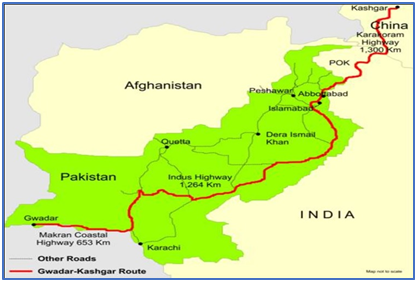China-Pakistan economic corridor expansion hits bumps
29-09-2023
08:04 AM
1 min read

What’s in today’s article?
- Why in news?
- What is China-Pakistan Economic Corridor (CPEC)?
- Different phases of CPEC
- India & CPEC
- News Summary: China-Pakistan economic corridor expansion hits bumps
Why in news?
- China has refused to further expand cooperation in the areas of energy, water management, and climate change under the China-Pakistan Economic Corridor (CPEC).
- This refusal signals a strain in the ironclad friendship between the two all-weather allies.

China-Pakistan Economic Corridor (CPEC)
- During an April 2015 visit to Islamabad, Chinese President Xi Jinping and then Pakistani PM Nawaz Sharif unveiled the $46 billion China-Pakistan Economic Corridor (CPEC).
- CPEC quickly ballooned to $62 billion in pledges—one-fifth of Pakistan’s GDP—covering dozens of envisioned high-profile projects.
- The corridor links Xinjiang with Gwadar, and also passes through Pakistan-occupied Kashmir (PoK) where China is investing in a number of projects.
- Often described as a flagship project of the Belt and Road Initiative,the stated goal of CPEC is:
- to transform Pakistan’s economy by modernizing its road, rail, air, and energy transportation systems; and
- to connect the deep-sea Pakistani ports of Gwadar and Karachi to China’s Xinjiang province and beyond by overland routes.
Different phases of CPEC
- First Phase
- Various agreements such as energy, infrastructure, port development and the railway line construction have been signed i.e., first phase focused on infrastructure creation.
- Second Phase
- In February 2022, during the visit of Pakistani PM to China, industrial cooperation agreement was signed.
- The second phase primarily revolves around Special Economic Zones development and industrialisation.
India & CPEC
- CPEC and the Sovereignty of India
- This corridor is posing a threat to the sovereignty and the territorial integrity of India.
- It passes through Gilgit-Baltistan area of Kashmir which is occupied by Pakistan.
- The corridor enters into Gilgit-Baltistan through Khunjerab Pass.
- This area is a part of the erstwhile princely state of Jammu and Kashmir and claimed by India.
- This corridor is posing a threat to the sovereignty and the territorial integrity of India.
- CPEC and Security threat to India
- Ever since the construction of the corridor is started, the Chinese military presence in the area is also embarked.
- In 2017, Chinese troops marched in the parade of Pakistan’s day in Islamabad.
- This was the first time when Chinese military took part in any parade outside its country
- Apart from the naval vessels deployed in Pakistan, eight submarines are also delivered to it by China.
- China is planning to build its second a naval base in Gwadar port after Djibouti in 2017.
- These activities of China are a serious security threat to India since China is encircling India into the Indian Ocean.
News Summary: China-Pakistan economic corridor expansion hits bumps
- Beijing has turned down several of Islamabad’s proposals related to direct investments in multiple sectors under the CPEC, including energy, tourism, water management and climate change.
- This was indicated by the signed minutes of the 11th Joint Cooperation Committee (JCC) of the CPEC.
- The JCC is a strategic decision-making body of the CPEC.
- China's disagreement to further expand cooperation in such areas under the CPEC underscores the challenges that both the sides are facing in deepening the economic ties.
Q1) What is Gwadar Port?
Gwadar Port is situated on the shores of the Arabian Sea in the city of Gwadar, located in the Pakistani province of Balochistan.
Q2) Where is Khujerab Pass located?
The Khunjerab Pass is located in the Karakoram Mountains on the northern border of Pakistan and the southwest border of China. It is the highest border crossing in the world. The pass is located in the Gilgit–Baltistan Hunza-Nagar District of Pakistan and the Xinjiang region of China. It's 4,693 meters (15,397 feet) high.
Source: China refuses to further expand cooperation with Pak in energy, water, climate under CPEC | India Today | Time of India


